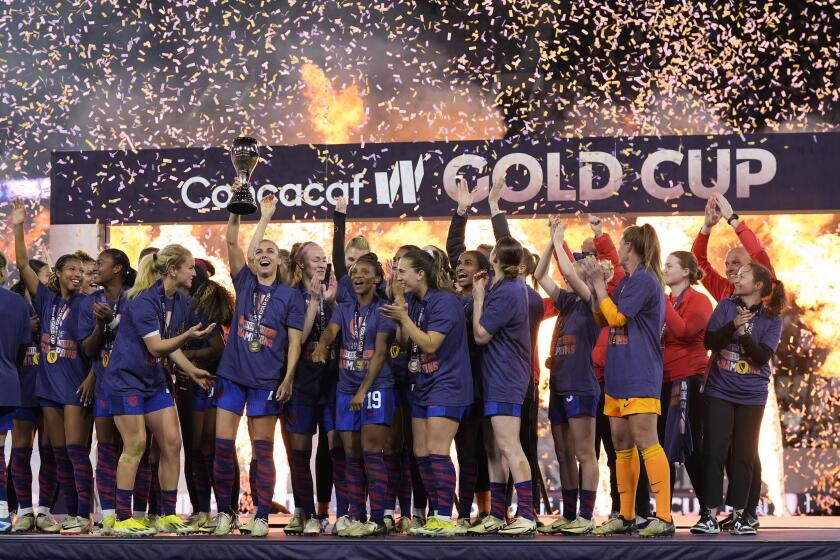ATHLETICS : CEO Carries Flame of Desire to Paralympics : Santa Barbara athlete leads group organizing Atlanta events. He credits sports for his mental recovery after train accident.
For a time after Andy Fleming lost both legs in a train accident in 1977, it seemed that his life was over--or at least the parts of it that mattered most. Before the accident he had been a robust man of 24, active in sports, with a bright future.
But afterward, he said, “I started going down a slippery slope--self-abuse, really.” He questioned what he would do with the rest of his life.
Then he rediscovered sports. In his hometown of Santa Barbara, Fleming found himself playing wheelchair basketball and tennis with people who had even more serious disabilities than his own, but who nonetheless were “healthy, happy, purposeful people.”
He regained his self-esteem and, before long, began lobbying the city for sports programs aimed at people with disabilities.
He was named the program’s first coordinator and staged events calculated to get media attention as a way of bringing out spectators. His success in the job led to his becoming executive director of the National Wheelchair Athletics Assn., which led to work with the Paralyzed Veterans of America, which led, indirectly, to his current post: president and chief executive officer of the organization staging the 1996 Paralympic Games, which bills itself as the world’s second-largest sporting event, second only to the Olympics.
The last Paralympiad, in 1992 in Barcelona, drew 1.5 million spectators. The games have a low profile in the United States, but that is likely to change next year, when the first full-fledged Paralympics to be held in this country takes place in Atlanta.
Athletes from more than 100 nations will participate in 17 sports during 10 days of competition starting Aug. 6, 1996, days after the closing of the Olympic Games.
The Paralympics have staged games every Summer Olympic year since 1960, usually in the city that hosts the Olympic Games.
Disarray in the various organizations representing the athletes resulted in Paralympic events being split between England and Long Island, N.Y., in 1984, when Los Angeles hosted the games.
Some people confuse the Paralympics with the Special Olympics, which stages sporting events for the mentally disabled. Next year, for the first time, athletes with mental disabilities will be allowed to compete on a limited basis in the Paralympics, fulfilling a decision made three years ago by the International Paralympic Committee.
Fleming’s group initially resisted the inclusion but agreed to compromise. Mentally disabled athletes--defined as persons with an IQ below 70--will be allowed to compete against each other in four swimming and four track-and-field events.
He resisted, Fleming said, because he did not want to compromise the Paralympics’ tradition of staging events for elite athletes who have physical disabilities.
Even though athletes participating in the Paralympics have disabilities, Paralympic organizers strive to make the games as close as possible to the Olympic Games.
Events are held in the same venues, and the rules of competition remain the same except where they must be changed to accommodate a disability. For instance, in wheelchair tennis, players are allowed two bounces to accommodate the player’s slower pace.
“The athletes want an experience as close to an Olympic experience as they can possibly have,” Fleming said.
Many of the athletes participating in the Paralympics are of near-Olympic caliber, organizers said.
They cite athletes such as Trischa Zorn, a visually impaired swimmer who missed making the 1992 U.S. Olympic team by 1/100 of a second and won 10 Paralympic gold medals that year; Arnie Boldt, a single-leg amputee who has high-jumped 6 feet, 8 1/2 inches; and Tony Volpentest, a double-leg and double-arm amputee who, using prostheses, runs 100 meters in 11.6 seconds, less than two seconds behind Carl Lewis’ 1992 world record.
Atlanta’s Olympic organizing committee has become a Paralympics sponsor, offering cash and in-kind contributions. A number of corporations, including some official Olympic sponsors, are also contributing funds.
The Paralympics have become a point of pride for the disabled community, said Fleming, who was a nationally recognized wheelchair athlete. He was elected to the National Wheelchair Athletic Assn.’s Hall of Fame in 1994.
Sports have been a savior for many disabled athletes, he said. “People who have disabilities have used sports as a way of dealing with their disabilities, putting their heads on straight and going in the right direction.”
In addition, he said, the Paralympics subscribe to the American ideal of “everybody having a shot at rising to the level of their ability.”
More to Read
Go beyond the scoreboard
Get the latest on L.A.'s teams in the daily Sports Report newsletter.
You may occasionally receive promotional content from the Los Angeles Times.




